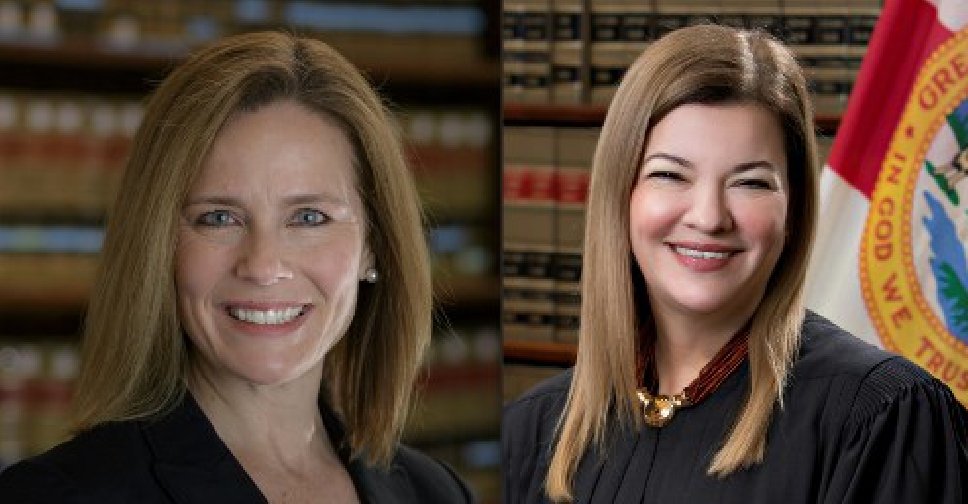
President Donald Trump on Saturday plans to name conservative appellate judge Amy Coney Barrett (left) as his third U.S. Supreme Court appointment, setting off a scramble in the Republican-led Senate to confirm her before Election Day in 5-1/2 weeks.
Senate Majority Leader Mitch McConnell has made confirming Trump's judicial nominees a top priority and Judiciary Committee Chairman Lindsey Graham, who mounted an angry defense of Trump's last high court nominee Brett Kavanaugh in 2018, has signaled he expects to have Barrett confirmed as a justice by Nov. 3.
Barrett, 48, was appointed by Trump to the Chicago-based 7th U.S. Circuit Court of Appeals in 2017 and is a favorite of religious conservatives, a key Trump voter bloc. Her confirmation to replace liberal icon Ruth Bader Ginsburg, who died at age 87 on Sept. 18, would make Barrett the fifth woman ever to serve on the top U.S. judicial body and push its conservative majority to a commanding 6-3.
Trump plans to formally introduce his nominee at a 5 p.m. (2100 GMT) White House ceremony. Conservative activists hailed Trump's selection, which surfaced on Friday night, while liberals voiced dismay.
Democrats, still seething over McConnell's 2016 refusal to consider President Barack Obama's Supreme Court nomination of Merrick Garland because it came during an election year, will raise objections to Barrett but have scant chances of blocking confirmation. Democratic presidential candidate Joe Biden has said the winner of the election should get to replace Ginsburg.
Trump's fellow Republicans hold a 53-47 Senate majority, and only two Republican senators have opposed proceeding with the confirmation process. Democrats, however, can be expected to make the process as difficult as possible.
Abortion rights advocates have worried that Barrett could cast a vote for overturning the 1973 landmark ruling legalizing abortion nationwide.
On the 7th Circuit, Barrett has staked out conservative legal positions in three years on the bench, voting in favor of one of Trump's hardline immigration policies and showing support for expansive gun rights. She also authored a ruling making it easier for college students accused of campus sexual assaults to sue their institutions.
Like Trump's two other appointees, Neil Gorsuch in 2017 and Kavanaugh in 2018, Barrett is young enough that she could serve for decades, leaving an enduring conservative imprint. Barrett would be the youngest Supreme Court nominee since conservative Clarence Thomas was 43 in 1991.
A devout Roman Catholic, she and her lawyer husband have seven children, two of whom were adopted from Haiti. Born in New Orleans, Barrett received her law degree from Notre Dame Law School, a Catholic institution in Indiana.
The other finalist mentioned by Trump to fill the vacancy was Barbara Lagoa (right), a Cuban-American federal appeals court judge from Florida who he appointed last year.



 Australia passes social media ban for children under 16
Australia passes social media ban for children under 16
 17 killed as Israel ups bombing in Gaza
17 killed as Israel ups bombing in Gaza
 Israeli tank fires on south Lebanon
Israeli tank fires on south Lebanon
 Landslides in Indonesia's Sumatra kill at least 27
Landslides in Indonesia's Sumatra kill at least 27
 Syrian armed group makes first advance in years
Syrian armed group makes first advance in years







